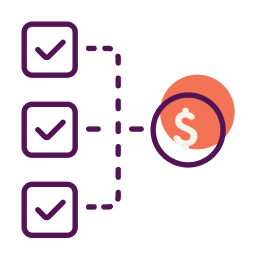Over 60% of small businesses don’t currently see the perks of using artificial intelligence (AI) to help run their business. However, there are many benefits that AI tools can offer business owners — they just have to know where to start. This article discusses the best ways to use AI tools, which AI and machine learning tools are available, the pros and cons, and the financial impact of using AI tools.
What Are AI Tools?
AI tools for small business are software applications or platforms that leverage artificial intelligence (AI) technologies to help small businesses with various aspects of their operations. They’re also called artificial general intelligence (AGI). These tools help to automate tasks, make business owners more efficient, and offer valuable insights to help small businesses thrive.
Here are some of the best AI tools that small businesses can take advantage of:
- AI chatbots: AI-powered chatbots can handle customer questions and give instant responses, which can improve customer service.
- Data analytics: Analytics tools that use AI help small business owners collect and interpret large volumes of data, which enables them to gain insights into customer behavior, market trends, and their operational efficiency.
- Customer Relationship Management (CRM): AI-enhanced CRM systems help manage customer interactions by analyzing customer data, predicting customer behavior, and automating sales and marketing processes.
- Voice recognition systems: AI-driven voice recognition technology enables small businesses to transcribe voice recordings, automate call routing, and develop voice-controlled applications, enhancing communication and workflow efficiency.
- Fraud detection: AI-powered fraud detection tools analyze patterns and anomalies in transactions, identifying potential fraud instances and protecting small businesses from financial losses.
- Content generation: AI tools can generate content such as blog posts, social media updates, or product descriptions. These tools can save time and effort for small business owners and marketers.
- Workflow automation: AI-based workflow automation tools streamline repetitive tasks, such as data entry or invoice processing, which can reduce manual errors and increase productivity.
These AI tools can level the playing field for small businesses by providing access to advanced technologies that were previously available only to larger enterprises. They can enhance efficiency, productivity, customer service, and more while allowing small business owners to focus on growth and innovation.
Benefits of AI Tools in Business
AI tools can empower businesses to make smarter decisions, automate processes, and improve customer experiences. Here are several key advantages of using AI tools in business.
Automation and efficiency
AI tools can automate repetitive and time-consuming tasks, allowing employees to focus on more strategic and value-added activities. This automation can improve efficiency, reduce human error, and increase productivity.
Better decision making
AI tools analyze vast amounts of data quickly and accurately, providing valuable insights and patterns that can help small business owners make decisions. Businesses can make decisions based on what their data tells them, identify trends, and predict outcomes more accurately, which can lead to better strategic planning and resource allocation.
Improved customer experience
AI-powered chatbots and virtual assistants can provide round-the-clock customer support to answer questions, automate follow-up, and offer personalized recommendations. This can improve customer satisfaction, increase engagement, and foster long-term customer relationships.
Personalized marketing
AI marketing tools let businesses deliver more targeted experiences to their customers. By analyzing customer data, AI can generate tailored recommendations, personalized content marketing campaigns, and targeted offers, which can result in higher customer engagement and conversion rates. It can also help with social media management.
Reduced costs
AI automation can help businesses reduce operational costs by streamlining processes, optimizing your resources, and minimizing errors. For example, automated data entry and document processing can save time and eliminate the need for manual labor.
Enhanced security
AI-powered security systems can track network traffic, identify potential threats, and detect anomalies in real-time. This helps protect businesses from cyberattacks and fraud, which can safeguard sensitive data and maintain customer trust.
5 Ways to Use AI Tools for Small Businesses
AI isn’t meant to replace employees or contractors entirely but instead support their work. Here are five common ways small businesses use the power of AI to improve their business’s operations.
Customer service
Using AI for customer service can greatly enhance the customer experience and streamline support processes. First you’ll need to identify the specific areas where AI can add value, like reducing response times, improving self-service options, or enhancing the overall customer experience.
Chatbots are the most common use case for AI in customer service. You can implement chatbots with natural language processing (NLP) to enable them to understand and respond to customer queries in a conversational manner. This allows for more natural interactions. Also, you can integrate your chatbot with a knowledge base that contains answers to frequently asked questions, product information, and troubleshooting guides, which helps the chatbot provide accurate information to customers. Chatbots can also be programmed to escalate complicated requests to human agents.
Marketing and sales
AI can be a powerful tool in marketing and sales when paired with your marketing platform. You can use predictive tools that use AI to analyze historical metrics and identify patterns, trends, and correlations. This can help you forecast customer behavior, predict market trends, and optimize marketing and sales strategies accordingly. Also, AI can help you find the best customer segments based on characteristics, behaviors, or preferences. This segmentation allows for targeted marketing campaigns and personalized messaging tailored to specific customer segments.
Another way to use AI in marketing is for content generation and content creation. AI tools like OpenAI’s ChatGPT or Jasper AI can generate content, such as blog posts, social media updates, or product descriptions, based on guidelines you define. This automation can save time and resources while maintaining quality.
You can also use AI to assist your sales teams by forecasting sales outcomes and optimizing your sales process by finding bottlenecks and inefficiencies. Also, integrating AI into your CRM system can help you to better target customers in customer outreach like email marketing or social media posts.
Operations and logistics
Using AI for operations and logistics can help businesses and entrepreneurs optimize their supply chain and improve efficiency. One common use for AI is with data collection from places like inventory systems, transportation records, sales data, and customer orders. You can also use AI algorithms to analyze historical sales data, market trends, and external factors to make accurate forecasts to help optimize inventory levels, production planning, and resource allocation.
Also, you can leverage AI-powered analytics tools to gain real-time visibility into the entire supply chain. AI can monitor for bottlenecks, track shipments, detect potential disruptions, and provide proactive alerts. It can also help you to predict when your equipment will need maintenance to reduce downtime and increase the lifespan of your equipment.
Remember to integrate AI tools into existing operational processes gradually and involve relevant employees to make sure the transition goes smoothly.
Human resources
AI can significantly transform and optimize various aspects of human resources (HR) functions, including recruitment, employee engagement, talent management, and workforce analytics. It can help with screening resumes and sourcing candidates, as well as improve engagement and get temperature checks from employees during onboarding and as they continue to work.
You can also use AI to track performance like project outcomes and peer feedback, as well as recommending training and career development paths. Additionally, AI can help you figure out your future workforce needs.
AI algorithms can also detect language or criteria that may introduce bias and suggest improvements to promote fairness and diversity, as well as help to diversify how businesses source potential candidates for jobs.
Finance and accounting
AI has the potential to revolutionize finance and accounting processes by automating repetitive tasks, providing accurate insights, and enhancing decision-making. Small businesses can use AI to gather relevant financial data from various sources like accounting systems, transaction records, bank statements, and invoices. It can also help with automated bookkeeping and data entry to reduce potential errors.
Additionally, you can apply AI algorithms to analyze financial data, identify trends, and generate accurate reports. It can help detect fraud and suspicious transactions by detecting irregularities and letting you know. AI can also categorize expenses, identify duplicates or errors, and streamline reimbursement procedures, which helps your business save time and stay compliant.
You can also combine AI with Robotic process automation (RPA) to automate routine financial tasks, such as accounts payable and accounts receivable processes. AI-powered bots can process invoices, reconcile accounts, and generate financial reports, improving efficiency and accuracy.
The Financial Impact of Using AI Tools for Small Businesses
Using AI tools for optimization can have positive and negative financial impacts on small businesses. Let’s explore both the pros and the cons of AI on your business finances.
Pros
- Cost reduction: AI tools can automate repetitive tasks, reducing the need for manual labor and potentially lowering staffing costs.
- Increased productivity: AI tools can perform tasks at a faster rate and with higher accuracy compared to humans. Streamlining processes and reducing manual errors allows you to accomplish more in less time, resulting in cost savings and increased output.
- Better decision making: By leveraging AI-generated insights, businesses can optimize pricing strategies, identify cost-saving opportunities, and make more informed financial decisions, ultimately leading to improved profitability.
- Improved customer experience: AI-powered chatbots and personalized recommendations can enhance the customer experience. This can lead to repeat business, positive word-of-mouth referrals, and ultimately increased revenue.
- Fraud detection: AI tools can help small businesses detect and prevent fraudulent activities, minimizing financial losses. Small businesses can reduce the risk of financial fraud by using these tools.
- Improved cash flow management: AI tools can assist small businesses in managing their cash flow effectively. Insights on cash flow projections and potential liquidity issues can help small businesses avoid cash flow crunches, minimize borrowing costs, and maintain their financial health.
Cons
- Initial costs: Adopting AI tools often requires an upfront investment in terms of purchasing or developing the technology, integrating it into existing systems, and training employees. These costs can be significant for small businesses with limited financial resources, and it may take time to see a return on investment.
- Steep learning curve: AI technology can be complex, requiring specialized knowledge and expertise to implement and manage effectively. Failure to understand and utilize AI tools properly can lead to inefficiencies, errors, and wasted resources.
- Lack of human interaction and personalization: While AI tools can automate certain tasks and provide efficiency, they may lack the personal touch and human interaction that customers value. Over-reliance on AI-driven customer interactions could result in a loss of trust and loyalty from your customers. It’s important to strike the right balance.
- Integration challenges: Integrating AI tools into existing business processes and systems can be complex, especially if the tools are incompatible with your current infrastructure or require significant modifications. Poor integration can lead to disruptions, inefficiencies, and additional costs.
- Dependence on external providers: Small businesses that rely heavily on third-party AI tool providers may face risks like service disruptions or changes in pricing structures.
How and Why You Should Prevent Over-reliance on AI Tools
Preventing over-reliance on AI tools in business is important for several reasons. First, there is a potential for errors. AI tools are only as good as the data they’re trained on and the algorithms they use. If the data is not high-quality, incomplete, or biased, it can lead to inaccurate results and flawed decision making. Relying solely on AI tools without human oversight can result in critical errors that can have financial and operational consequences.
Plus, AI tools may struggle to understand complex or nuanced situations that require contextual understanding, judgment, or creativity. Human expertise and intuition are crucial in such scenarios where AI tools may fall short.
There are also ethical issues to consider. AI tools can unintentionally perpetuate biases present in the data they’re trained on, which can lead to discriminatory outcomes or reinforce existing inequalities. Human oversight is necessary to make sure AI tools are used ethically.
Additionally, while AI tools can enhance efficiency and automate certain tasks, customers value human interaction, personalized attention, and empathy. Over-reliance on AI tools in customer interactions may damage the trust your customers have in your business.
Relying too much on AI tools can also potentially lead to devaluing human abilities and discouraging employees from developing their skills. Investing in the training and development of employees’ expertise can bring unique perspectives, creativity, and problem-solving abilities that complement the capabilities of AI tools.
To prevent over-reliance on AI tools, businesses should consider the following steps:
- Establish clear guidelines and processes for the use of AI tools, making sure they’re integrated with human decision making and oversight.
- Invest in employee training and development to enhance skills that complement the capabilities of AI tools.
- Regularly evaluate and validate the accuracy, fairness, and ethical implications of AI tools and the data they rely on.
- Foster a culture that encourages critical thinking, creativity, and collaboration between humans and AI tools.
- Continuously monitor and assess the performance and impact of AI tools, seeking feedback from employees, customers, and stakeholders.
By maintaining a balanced approach that combines the strengths of AI tools with human judgment, businesses can make more informed and effective decisions while mitigating the risks associated with an over-reliance on AI.
This article was originally written on December 4, 2023.




Have at it! We'd love to hear from you and encourage a lively discussion among our users. Please help us keep our site clean and protect yourself. Refrain from posting overtly promotional content, and avoid disclosing personal information such as bank account or phone numbers.
Reviews Disclosure: The responses below are not provided or commissioned by the credit card, financing and service companies that appear on this site. Responses have not been reviewed, approved or otherwise endorsed by the credit card, financing and service companies and it is not their responsibility to ensure all posts and/or questions are answered.